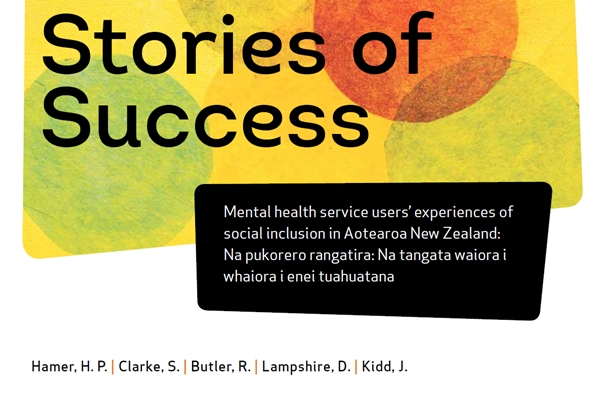Social inclusion, the key to recovery
Social inclusion, the key to recovery
Stories of Success is the latest publication the Like Minds, Like Mine national programme has produced in association with the Mental Health Foundation (MHF) to reduce the stigma and discrimination associated with mental illness.
The report focuses on how people living with mental illness have experienced social inclusion, and reveals – by using stories of friendship, acceptance and social inclusion – the powerful role friends, whānau, employers and others play in their recovery. A total of 53 people participated in individual and focus group interviews. The groups included young adults, Māori, and Pacific people, aged between 20 and 65-plus years. Open-ended interview questions ranged from ‘What is your understanding (or definition) of social inclusion?’ through to ‘Can you tell me how other people and/or situations that you encounter in your daily life have fostered your sense of social inclusion?’ and ‘How might the future look?’.
Boosting self-esteem through inclusion
Many participants spoke positively about how being included in community and social activities, and having access to employment and good housing, boosted their self-esteem. Dr Helen Hamer, the principal researcher and a senior lecturer for the School of Nursing at the University of Auckland, says the research’s main message is how important it is for people with lived experience to be able to participate in the everyday activities that most citizens take for granted.
She said it was an older wahine Māori in one of the focus groups who made an important, yet simple statement, which captured the essence of that need for inclusion.
“What makes me feel important is because of my family background, my identity as a New Zealand Māori and the coming of our ancestors because I’m a descendant, that’s something important about me, because I come off important ancestors... another thing that’s important about me too it is all to do with family history... really my breakdown is when I lose someone in my family, like a close father or a brother or a sister, because that’s why I’m important, because I’m important to my family and I’m important to my husband now.” (Māori focus group)
“Talking about how her identity is shaped by her cultural heritage, how the people in her whānau, hapū and iwi make her feel important and that she matters is what social inclusion is all about,” Helen says.
Co-researcher Dr Jacquie Kidd believes that one of the most important features of the research was its focus on what was working well for people. She says the team hope that because of the variety of stories that participants told, that people reading through those will be able to connect with one of those stories, and adapt and include those ideas to suit their own situations and circumstances.
Jacquie also highlights one of the key recommendations – the need for a stronger youth presence in the Like Minds programme. “This age group are incredibly open about the things they are going through and share everything online,” she says. “It would be great to see the programme get in there and find out what prompts them to share, whether it helps, and to take any wisdom on board.”
Negative labels and stereotyping are barriers to social inclusion
One of the major barriers to social inclusion identified was the negative labels and stereotypes attributed to people with mental health problems. As a nursing lecturer at the University of Auckland working with post-graduate students, Jacquie is already using these research findings in her classes. “One of the most powerful findings is reinforcing to my students how important it is to stop speaking for people with lived experience of mental illness and allow them to make their own decisions,” she explains. “The research showed that, as inpatient nurses, we can have a profound impact on people – if we treat them as real people and not just a bunch of symptoms – even if we only see them for a short time.”
Conversely, if you are a person with lived experience, Jacquie believes that “you need to drop the idea that you are not entitled to anything”. “We all need to notice when people are excluded, or feeling excluded, and step up and stop that situation, so that people’s self-stigma, their feelings of unworthiness and not being listened to, are addressed.”
Social inclusion is “a basic human need, and a right”
Hugh Norriss, the MHF’s Director of Policy and Development, agrees that social inclusion is “a basic human need, and a right”. “Stories of Success highlights how important being socially included is for people experiencing mental illness, and for all New Zealanders,” Hugh says. “Being excluded can increase the distress for people who are already going through a tough time, and make the recovery journey much harder. “Research shows that people who access mental health services and are socially excluded have higher mortality rates,” Hugh adds. “By increasing the options for social inclusion, people experiencing mental illness are able to live fuller, happier lives and find the support they need.”
The publication of Stories of Success is timely given the direction of the new Like Minds, Like Mine National Plan 2014-2019, which has signalled social inclusion as a key priority area. “The examples given in this report will help to inspire other people living with mental illness and show communities that what they do makes a difference,” Hugh says.
Good reads

Editorial
Five ways to reduce discrimination
Mental illness discrimination has a long, pervasive history. Many widely held negative... Read more
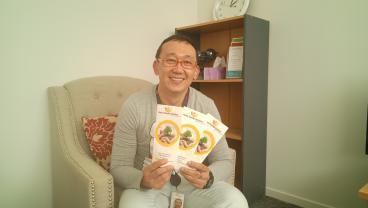
Community Grants
Ivan's project: "You Are Not Alone"
You Are Not Alone is a video and poster campaign produced by... Read more
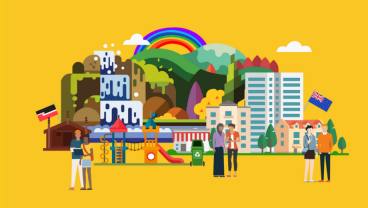
Ngā Kōrero and mental distress
What young people want
People under the age of 25 make up around 33% of our... Read more
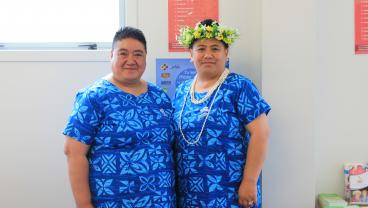
Pacific models create non-discriminatory environments
Susanne
Susanne Cummings' journey started almost 20 years ago when she lived through... Read more
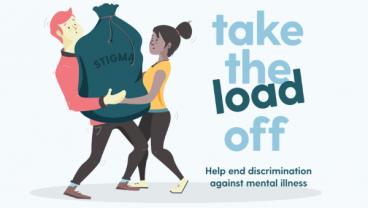
Editorial
Take the Load Off
Take the Load Off is an online campaign to reduce mental illness... Read more

Rainbow identities and mental distress
Discrimination, compounded
Moira Clunie is a community advocate whose work focuses on making New... Read more

